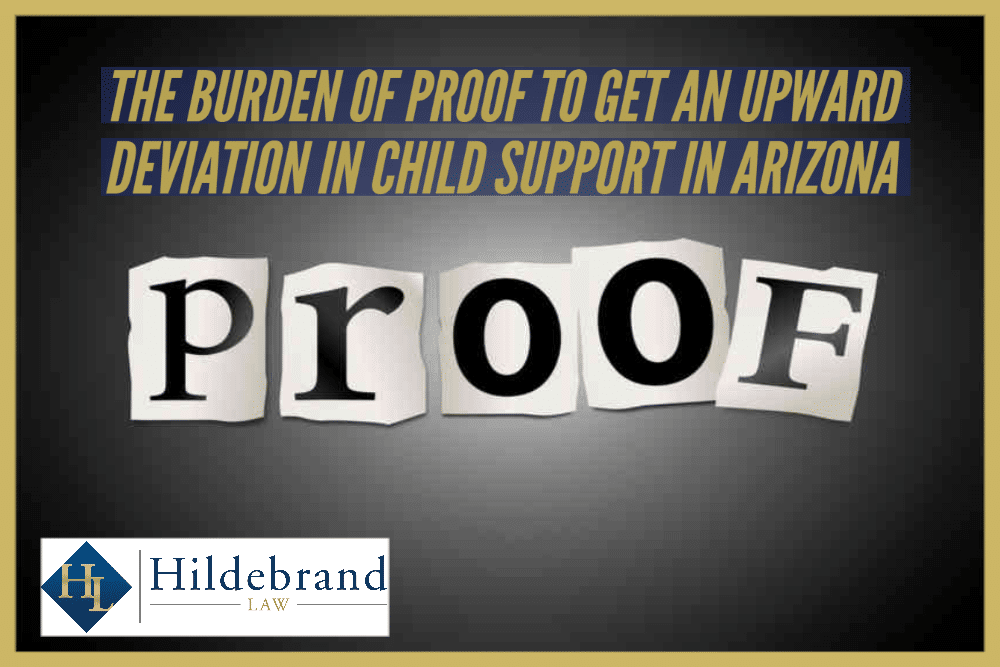Upward Deviation in Child Support in AZ | Hildebrand Law, PC

The Arizona Court of Appeals in a memorandum decision in the case of Bowe vs. Vogel had to decide what a superior court must do in order to award a deviation above the amount set forth in the Arizona Child Support Guidelines.
The Court of Appeals stated Mother appeals the dissolution decree dissolving her marriage to Father. Mother challenges the superior court’s rulings on child support, property division, and attorney’s fees. For reasons that follow, we affirm.
The Court of Appeals stated the parties married in 1995. By the time Mother filed for divorce in January 2014, they had three children—an adult son, a seventeen-year-old son, and a nine-year-old daughter. In 18 years of marriage, the marital community accumulated significant wealth. Father is a successful land broker with the Arizona based firm Land Advisors Organization (“LAO”), with most of his income derived from commissions and dividends. His income has fluctuated from year to year, varying from $1 million to $7 million per year. Mother has not worked outside the home since having children and does not have a college degree. The parties reached some pretrial agreements outside of court concerning distributions, property division, and temporary family support payments of $30,000 per month to Mother.
The Court of Appeals stated but they were unable to resolve other issues, and the court conducted a three-day trial in April 2016. The court issued an 87-page decree in June 2016 ordering prospective spousal support of $25,000 per month for four years and $20,000 per month for an additional three years. The court also ordered Father to pay $1,202 in monthly child support, along with other expenses for the children. The court divided the parties’ assets, including life insurance policies and retirement funds, as well as the parties’ multi-million dollar homes in Paradise Valley and Flagstaff. The court valued Father’s business ownership interest in LAO at $3.5 million, of which Mother received half. Mother timely appealed, and we have jurisdiction under Arizona Revised Statutes (“A.R.S.”) § 12-2101(A)(1).

The Court of Appeals stated Mother contends the court erred in its determination of Father’s child support obligation. She asserts that the court (1) should have assigned a higher income to Father for purposes of determining the support obligation, (2) failed to properly consider the children’s pre-dissolution lifestyle, and (3) did not sufficiently show a basis for the final support obligation amount.
The Court of Appeals stated We review the superior court’s award of child support for an abuse of discretion. Hetherington v. Hetherington, 220 Ariz. 16, 21, (App. 2008). “[W]e will uphold the award unless it is devoid of competent evidence, and for any reason supported by the record.” Nia v. Nia, 242 Ariz. 419, 423, (App. 2017) (quoting Nash v. Nash, 232 Ariz. 473, 478, (App. 2013). Based on Father’s $83,333 monthly income and on Mother’s family support income, the court ordered Father to pay Mother $1,202 per month in child support. In addition, the court ordered Father to pay the full amount (rather than his proportionate share) of the minor children’s reasonable expenses for tuition, tutoring, counseling, school uniforms, and health care. Noting that the minor son was almost 18 years old, the court found that the tuition obligation (approximately $20,000 per year) would only apply to the parties’ nine-year-old daughter. Mother asserts that the court should have attributed to Father a higher income given that his average income over the four years before the trial was $200,000 per month.
The Court of Appeals stated the Arizona Child Support Guidelines (“Guidelines”), A.R.S. § 25-320 app., broadly define gross income to include commissions, bonuses, and dividends. Guidelines § 5(A). But the court need not attribute income that “is not continuing or recurring in nature” as gross income. Here, the court’s income determination is supported by the record. LAO’s president testified that, as of the time of trial, Father’s monthly commissions were approximately $60,000. Accepting that testimony, together with evidence that Father had a base salary of $10,000 per month, the court could have attributed to Father an income of $70,000 per month. Although the court recognized that Father’s monthly income has averaged around $200,000 in recent years, it also noted that Father only earned approximately $92,000 per month in 2015, the year before trial.
The Court of Appeals stated the court also considered testimony from Mother’s expert, who testified that Arizona’s real estate market was on an upward growth trend; from a jointly-retained expert, who stated that Father’s industry was “highly cyclical and volatile”; and from LAO’s president, who indicated that commissions and distributions were likely to increase later in the year. By attributing an income amount ($83,333) that was higher than Father’s then current income, the court implicitly recognized that Father’s income was likely to increase. Accordingly, the court based its income determination on a reasonable interpretation of the facts and did not abuse its discretion.
The Court of Appeals stated relying on Nash, Mother contends that the court failed to conduct a lifestyle analysis for the two minor children. 232 Ariz. at 475, She argues that instead of analyzing the children’s needs, the court incorrectly based its decision on her spending habits, and as a result, did not apply an adequate upward deviation. Under the Guidelines’ “Schedule of Basic Support Obligations,” a parent’s presumptive support obligation increases in step with the parents’ combined income up to $20,000 per month. If the combined income exceeds $20,000 per month, the court uses the $20,000 per month amount as a base, but may grant an upward deviation if it determines that the base amount would be “inappropriate or unjust.” Guidelines §§ 3, 8, 20.
The Burden of Proof to Get an Upward Deviation in Child Support in Arizona

The Court of Appeals stated the party seeking such an upward deviation has the burden to show that an increase would be in the children’s best interests; relevant factors for these purposes include “the standard of living the children would have enjoyed if the parents and children were living together,” the children’s needs exceeding the base amount, significant disparity of income between the parties, and any other factor relevant to the circumstances of a particular case. Guidelines § 8. The court “must consider the expense of allowing children who have enjoyed [the] benefits [of significant wealth] to continue to receive them after the dissolution.” Nash, 232 Ariz. at 480, But the court is not required to “provide child support that matches historical spending patterns, dollar-for-dollar.”
The Court of Appeals stated that further, the court must always consider the purpose of the Guidelines: “To establish a standard of support for children consistent with the reasonable needs of children and the ability of parents to pay.” Guidelines § 1(A). Mother argues that the facts, in this case, are like those in Nash, in which this court held that the superior court incorrectly interpreted the Guidelines to require granting either the entire requested deviated amount or nothing at all. See 232 Ariz. at 478–79. Here, however, the court granted an upward deviation, but in an amount, less than Mother had requested. The court found that “Mother has met her burden that application of the [G]uidelines is inappropriate at least as it relates to the additional costs” including the minor children’s tuition, tutoring, and counseling. Thus, the court considered the children’s pre-dissolution lifestyle in ordering an upward deviation of the child support obligation.
The Court of Appeals stated Mother asserts the evidence showed that the children need more money to maintain their pre-dissolution lifestyle, which included living in the parties’ 9,000 square foot home near Camelback Mountain, a staff of nannies and housekeepers, and vacations in “mansions . . . , jets, [and] yachts.” Mother requested $12,500 per month for approximately one year (until the minor son emancipates), and $10,000 per month thereafter. Mother explained that past necessary expenses included $8,000 per month for food because her home has always been the place her son’s friends come after school and she keeps food out for them, $800 per month for keeping a horse, $2,143 per month for cars and car insurance, and $2,667 per month for vacations.

The Court of Appeals stated the court found Mother’s justifications unpersuasive, giving two primary reasons for rejecting most of her requests: (1) even considering the children’s past lifestyle, her requests were not consistent with their reasonable needs, and (2) the parties’ income can no longer support such a lifestyle. The court stated that Mother’s request for over $2,000 per month in transportation expenses when only one minor child drives were “excessive” and “not a reasonable [cost] to assert.” And while discussing how both parents—but Mother in particular—had overspent in recent years, the court noted that Mother spent approximately $160,000 in vacation expenses in 2015 despite the costly pending divorce.
The Court of Appeals stated the court further noted that Mother and Father did not agree to any specific luxuries that the children should retain post-dissolution, and ultimately concluded that “[t]here is no evidence that these expenses are necessary, warranted or appropriate to occur in the future.” Compare Nash, 232 Ariz. at 479–80 (noting the parents’ agreement that the children should be able to continue to travel extensively). Mother argues that the superior court improperly focused on her personal spending. But the superior court correctly considered her spending in the context of the parties’ financial ability to maintain the pre- BOWE v. VOGEL Decision of the Court 6 dissolution lifestyle. See Guidelines § 1(A); Nash, 232 Ariz. at 480. Before the divorce, the parties acknowledged that they needed to reduce their spending and that even without separating, they likely would not have been able to sustain the same lifestyle they had in the past.
The Court of Appeals stated the Court of Appeals stated that he court thus reasonably concluded that “[t]he evidence reflects that it is not economically appropriate or feasible for the children to be supported in the manner Mother claims they should be supported.” Accordingly, the court did not err in its analysis, and its award of child support was not an abuse of discretion. Mother further contends that the court erred because it did not adequately detail how it reached Father’s total obligation amount. The superior court must make findings justifying an upward deviation and show what the support obligation would be both with and without the deviation. Guidelines § 20(A)(1)–(5). The court’s findings must be detailed enough for an appellate court to discern how the court arrived at the upward deviation. Stein v. Stein, 238 Ariz. 548, 551 (App. 2015). The findings, in this case, were sufficient.
The Court’s Ruling on an Upward Decision From the Arizona Child Support Guidelines

The Court of Appeals stated that first, the court filled out the child support worksheet using Mother’s and Father’s gross monthly income to find the basic support obligation under the Guidelines. The court made the proper adjustments for spousal support, the age of the children, parenting time, and medical insurance. Showing its reasoning and calculations, the court found that Father owed a $1,202 monthly child support obligation under the Guidelines. The court then found that application of the Guidelines would be unjust because of the income disparity between the parties and, considering the best interests of the children, ordered Father to pay additional costs including tuition, tutoring, and counseling. See Guidelines § 20(A)(1)–(2). The court, as required, made written findings as to these criteria. See Guidelines § 20(A)(3).
The court detailed what the support obligation would have been without the deviation and listed exactly what costs were included in the upward deviation. See Guidelines § 20(A)(4)–(5). Although the court did not specify the exact amount of the minor daughter’s tuition in the child support section of the decree, the court stated elsewhere in the decree, and also in a post-decree ruling, that tuition would be approximately $20,000 per year. The court also specified approximate costs for healthcare, uniforms for the children, tutoring for the minor son, and counseling costs. Although the court did not make specific mathematical calculations for each facet of the upward deviation, such specificity is not required.
If you have questions about upward deviation in child support in an Arizona divorce case, you should seriously consider contacting the attorneys at Hildebrand Law, PC. Our Arizona child support and family law attorneys have decades of combined experience successfully representing clients in child support and family law cases.
Our family law firm has earned numerous awards such as US News and World Reports Best Arizona Family Law Firm, US News and World Report Best Divorce Attorneys, “Best of the Valley” by Arizona Foothills readers, and “Best Arizona Divorce Law Firms” by North Scottsdale Magazine.
Call us today at (480)305-8300 or reach out to us through our appointment scheduling form to schedule your personalized consultation and turn your Arizona child support or family law case around today.
Contact Form
Other Articles About Child Support in Arizona
- ARIZONA CHILD SUPPORT LAWS
- THE DEFINITIVE GUIDE TO CHILD SUPPORT IN ARIZONA
- ARIZONA UNIFORM INTERSTATE FAMILY SUPPORT ACT (UIFSA) STATUTES
- ATTRIBUTING INCOME FOR CHILD SUPPORT IN ARIZONA
- DIVIDING UNCOVERED MEDICAL EXPENSES IN AN ARIZONA CHILD SUPPORT CASE
- THE RELATIONSHIP BETWEEN CHILD SUPPORT AND DEBTS IN ARIZONA
- DUE PROCESS REQUIRES NOTICE OF A CHILD SUPPORT MODIFICATION
- CHILD SUPPORT DEVIATION IN ARIZONA
- IS AN INCREASE IN INCOME CAUSE TO MODIFY CHILD SUPPORT IN ARIZONA
- CHILD SUPPORT AND ASSETS IN ARIZONA
- EFFECT OF EMPLOYMENT BENEFITS ON CHILD SUPPORT IN ARIZONA
- EFFECT OF STOCK OPTIONS ON CHILD SUPPORT IN ARIZONA
- MODIFYING CHILD SUPPORT FROM ANOTHER STATE IN ARIZONA
- CHILD SUPPORT MUST BE MODIFIED WHENEVER CHILD CUSTODY ORDERS CHANGE IN ARIZONA
- BURDEN OF PROOF FOR A DEVIATION IN CHILD SUPPORT IN ARIZONA
- REIMBURSEMENT FOR OVERPAID CHILD SUPPORT IN ARIZONA
- GIFTS AND FREE RENT MAY BE INCOME FOR CHILD SUPPORT PURPOSES
- COURT DISCRETION TO ADD RECURRING GIFTS AS INCOME FOR CHILD SUPPORT
- CHILD SUPPORT AND THE NARCISSIST PARENT
- INCLUDING INCOME FROM A SECOND JOB IN ARIZONA CHILD SUPPORT CALCULATIONS
- STANDARD OF PROOF TO ESTABLISH A WAIVER OF PAST CHILD SUPPORT IN ARIZONA
- CHILD SUPPORT CANNOT BE A PERCENTAGE OF A PARENT’S INCOME IN ARIZONA
- WHAT IS A WAGE ASSIGNMENT IN ARIZONA
- THE AGE WHEN CHILD SUPPORT ENDS IN ARIZONA
- SSDI PAYMENTS OFFSET MEDICAL EXPENSES FOR A CHILD IN ARIZONA
- MODIFYING CHILD SUPPORT WHEN NEITHER PARENT LIVES IN ARIZONA
- HOW TO MODIFY OR ENFORCE A CHILD SUPPORT ORDER ISSUED IN ANOTHER STATE
- HOW TO MAKE ARIZONA CHILD SUPPORT PAYMENTS
- HOW IS INCOME CALCULATED FOR CHILD SUPPORT IN ARIZONA
- HOW TO ENFORCE A CHILD SUPPORT ORDER IN ARIZONA
- WHAT IS CONSIDERED GROSS INCOME FOR ARIZONA CHILD SUPPORT
- CALCULATING A PARENT’S INCOME FOR CHILD SUPPORT IN ARIZONA
- ERRORS IN REGISTERING A CHILD SUPPORT ORDER FROM ANOTHER STATE IN ARIZONA
- DOMESTICATING A CHILD SUPPORT ORDER IN ARIZONA
- CHILD SUPPORT AND AN UNEMPLOYED PARENT IN ARIZONA
- WHAT DOCTORS SHOULD KNOW ABOUT CHILD SUPPORT IN ARIZONA
- CAN A NON-CUSTODIAL PARENT RECEIVE CHILDREN’S SOCIAL SECURITY BENEFITS IN ARIZONA
- START DATE FOR TEMPORARY SUPPORT IN ARIZONA
- EFFECT OF DENIAL OF VISITATION ON CHILD SUPPORT PAYMENTS IN ARIZONA
- ARIZONA CHILD SUPPORT FREQUENTLY ASKED QUESTIONS
- EFFECT OF ERRORS IN REGISTERING A CHILD SUPPORT ORDER FROM ANOTHER STATE IN ARIZONA
- WHEN YOU CAN MODIFY CHILD SUPPORT IN ARIZONA
- GIFT INCOME AND MODIFICATION OF CHILD SUPPORT IN ARIZONA
- WAIVER OF PAST CHILD SUPPORT BY AGREEMENT IN ARIZONA
- MODIFYING A CHILD SUPPORT ORDER FROM ANOTHER COUNTRY
- OBJECTION TO CHILD SUPPORT ARREARS IN UIFSA DOMESTICATION IN ARIZONA
- CAN A SPOUSE’S INCOME BE CONSIDERED FOR CHILD SUPPORT IN ARIZONA
- LEGAL METHODS OF COLLECTING CHILD SUPPORT PAYMENTS IN ARIZONA
- ENFORCEMENT OF A FOREIGN COUNTRY CHILD SUPPORT ORDER IN ARIZONA
- DRIVERS LICENSE RESTRICTIONS FOR UNPAID CHILD SUPPORT IN ARIZONA
- CAN A LOAN BE INCLUDED AS INCOME FOR CHILD SUPPORT IN ARIZONA
- OVERPAYMENT OF CHILD SUPPORT IN ARIZONA
- PAST DUE SUPPORT PAYMENTS APPLY FIRST TO CHILD SUPPORT BEFORE ALIMONY
- CALCULATING CHILD SUPPORT WITH SPLIT CUSTODY OF CHILDREN IN ARIZONA
- EFFECT OF DELAY IN COLLECTING CHILD SUPPORT ARREARAGES IN ARIZONA
- RECOVERING CHILD SUPPORT NOT ORDERED IN A DIVORCE DECREE IN ARIZONA
- LEGAL OPTIONS FOR COLLECTING CHILD SUPPORT PAYMENTS IN ARIZONA
- ARIZONA COURT’S AUTHORITY TO HEAR CHILD SUPPORT ENFORCEMENT ACTIONS
- IMPACT OF WITHHOLDING A CHILD ON CHILD SUPPORT IN ARIZONA
- SISTER STATE’S RIGHT TO MODIFY ARIZONA CHILD SUPPORT RULING
- IS A CHILD SUPPORT ORDER VOID IF IT DOES NOT MENTION ARREARS IN ARIZONA
- CHILD SUPPORT OBLIGATIONS OF A MINOR IN ARIZONA
- TIME LIMIT TO COLLECT CHILD SUPPORT ARREARAGES IN ARIZONA
- RETROACTIVE MODIFICATION OF A CHILD SUPPORT ORDER IN ARIZONA
- CONTEMPT OF COURT FOR UNPAID CHILD SUPPORT ARREARAGES IN ARIZONA
- SUPPORT FOR DISABLED ADULT CHILDREN IN ARIZONA
- CALCULATING INCOME FOR CHILD SUPPORT IN ARIZONA
- DISMISSING MODIFICATION OF CHILD SUPPORT FOR NOT DISCLOSING FINANCIAL DOCUMENTS
- ARIZONA CHILD SUPPORT MODIFICATIONS MUST INCLUDE ANY CHANGES IN PARENTING TIME
- EQUITABLE DEFENSES TO FAMILY SUPPORT IN ARIZONA
- AFFIDAVIT OF CHILD SUPPORT ARREARS FROM ANOTHER STATE IN ARIZONA
- PERSONAL JURISDICTION AND CHILD SUPPORT ARREARAGES IN ARIZONA
- PERSONAL JURISDICTION OVER A NON-RESIDENT IN AN ARIZONA CHILD SUPPORT CASE
- ARIZONA CRIMINAL LAW FOR NON-PAYMENT OF CHILD SUPPORT IS CONSTITUTIONAL
- BURDEN OF PROOF IN A MODIFICATION OF CHILD SUPPORT CASE IN ARIZONA
- FULL FAITH AND CREDIT CLAUSE REQUIRES PERSONAL JURISDICTION TO ENFORCE SUPPORT ORDERS
- CHILD SUPPORT IN A BANK ACCOUNT IS EXEMPT FROM EXECUTION BY CREDITORS
- NON-PARENT LAWSUIT FOR REIMBURSEMENT OF CHILD SUPPORT IN ARIZONA
